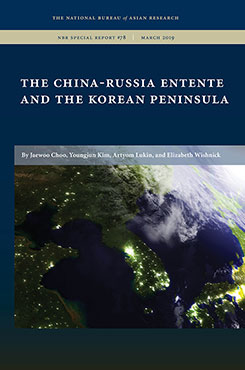The Impact of the Sino-Russian Partnership on the North Korean Nuclear Crisis
This essay examines the impact of the Sino-Russian partnership on the North Korean nuclear crisis and assesses the U.S. policy implications.
Executive Summary
MAIN ARGUMENT
China and Russia have parallel, but not identical, interests in the North Korean nuclear crisis, reflecting the different roles they play in East Asia. This shows the flexibility of the Sino-Russian partnership, rather than its limitations, and presents new challenges for U.S. policy. While they both supported a “double freeze” proposal and were opposed to the deployment of Terminal High Altitude Area Defense (THAAD), China aspires to be a powerbroker in the conflict and appreciates North Korea’s utility as a buffer against the alliance between the U.S. and the Republic of Korea (ROK), while Russia views the nuclear crisis as an opportunity to demonstrate its relevance as a great power in Asia and move forward with its regional economic initiatives.
POLICY IMPLICATIONS
- Shared norms and principles have brought China and Russia together on North Korea policy. The nuclear crisis has further strengthened the Sino-Russian partnership, despite differences between the two countries, which limits U.S. policy options and complicates relations between the U.S. and the ROK.
- Although Russia tends to be viewed as the “spoiler,” its endgame for the Korean Peninsula, involving multilateral cooperation with South Korea, requires a settlement of the nuclear crisis so that sanctions will be lifted. The conflictual U.S.-Russia relationship, however, reduces Russian incentives for cooperation, even though Russian policy toward the North Korean crisis is generally in greater alignment with U.S. objectives than is China’s policy.
- China is often seen as the key to conflict resolution, but it will be willing to tolerate a low level of tension on the Korean Peninsula, as long as the risk of war is low, to distract the U.S. from its efforts to constrain China. The trade war makes China even less receptive to U.S. overtures for cooperation.
- Friction in U.S.-ROK relations enables China to drive a wedge between the two countries—for example, by extracting a pledge from South Korea to limit the deployment of THAAD in exchange for a removal of Chinese sanctions.
Elizabeth Wishnick is Professor of Political Science at Montclair State University
in New Jersey.


